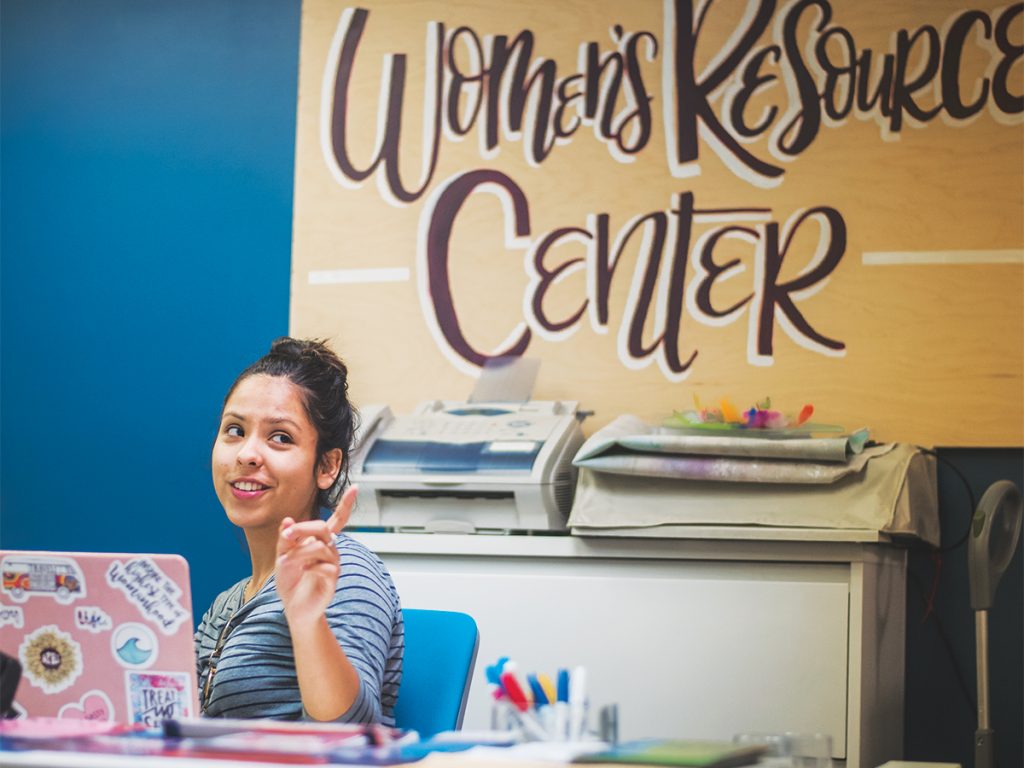
Claudia Jimenez, a second-year political science major, first heard about the #metoo movement while watching the Ellen Show. “Ellen was going over how she had seen the movement blow up on Twitter. Initially I was shocked at the amount of women who were willing to publically share their story and demonstrate their support on social media,” said Jimenez. “Sadly, I was more amazed at the amount of women brave enough to show their support rather than the number of women who confessed to being sexually harassed.”
The first time the phrase #metoo was used online was by activist Tarana Burke in 2006. The hashtag went viral October 2017 when actress Alyssa Milano began using the hashtag following the accusations against Harvey Weinstein. In response, Hollywood celebrities founded Time’s Up, a movement against sexual harassment, on Jan. 1, 2018.
Jimenez has been volunteering at the Women’s Resource Center (WRC) since fall of 2017. Ever since the #metoo movement gained momentum, Jimenez has noticed an increase in people’s willingness to talk about sexual harassment.
According to Nathaly Martinez, program coordinator for the Women’s Resource Center, attendance rates for the center’s programs has increased. Attendance for the annual Take Back the Night event doubled from 96 last year to 200 people in attendance. The amount of shirts made per day for the Clothesline Project increased from six shirts per day to 20 shirts per day. Over 200 people registered to attend the center’s first Persist conference in 2017, and the day of the conference, 300 people attended.
The amount of volunteers for the WRC has also increased and requests from student organizations to facilitate programs increased. Involvement from sororities has also increased. “Before people would just ask what the programs were about but now they actually take the time to come in and talk to us and say ‘how can we help’ how can we get involved,” Martinez explains.
The CARE office on campus has also facilitated conversations around campus to increase the awareness and support for survivors. Around 15 people attended “Reading Between the Hashtags,” led by fourth-year gender and sexuality major and CARE program assistant Alana Anguren on Jan. 24. Anguren facilitated a conversation about the effect #metoo had on conversations concerning sexual violence. The program also addressed how the movement rapidly gained momentum in 2017 through Milano’s tweets but was created in 2006 by Burke. “The Me Too Movement was meant to center on the voices of WOC and LGBTQ+ folx, but it has been co-opted by white trans-exclusionary feminists,” explains Anguren in an email.
Sexual harassment and sexual assault is an issue that affects many departments on campus and the WRC has recognized this through collaborating with other departments to include the voices of those in marginalized communities to be apart of the programming. For the upcoming program, “An Evening with Roxane Gay,” the WRC is collaborating with the LGBT Resource Center, African Student Programs, the WELL and the creative writing department.
Denise Davis, director of the Women’s Resource Center, has noticed how students are engaging with the programming. Davis recalls when she met a student a couple of days ago who was looking at the “An Evening with Roxane Gay” event poster. Gay’s recent memoir, “Hunger,” details her life as a survivor of assault and her struggles through coping by eating. Gay also struggled with obesity, identifying as queer and living with the trauma of her assault.
The student asked Davis who was Roxane Gay. After Davis explained who Gay was and the topic of “Hunger,” the student replied, “Well I can relate to a lot of those experiences.”
“We are in a time in our nation where we can’t afford to go back,” states Romanie Arterberry, the student life and development specialist in the WRC. Anguren hopes that future generations promote community accountability. “The criminal justice system is so flawed and does not recognize the nuances of sexual violence,” explains Anguren. “Therefore, it is necessary for us to address the impacts of coercion and the prevalence of ‘bad sexual experiences’ among womxn and femmes.”
One of the legal resources on campus for survivors is the Title IX office. Title IX is a federal law that holds federally funded colleges and universities legally responsible for sexual harassment and sexual assault occurring under their knowledge. However, the policy has its flaws. “The Title IX policy is not as equitable towards both sides as one would like to think. Title IX has to be unbiased. It’s not as trauma-informed as I think it should be,” says ASUCR executive vice president and third-year cell, molecular and developmental biology major Carisha Moore. Moore is the UCR undergraduate representative in the UC Title IX student advisory board. The board was created to address and fix the issues of malpractice within the Title IX policy. The board allows student representatives to gather feedback from students at their respective campus and together submit a process addressing the discrepancies for approval.
Moore was aware about the Title IX office and the resources they provide. “I hadn’t known about the issues within Title IX until after I had applied,” she states. After talking to the CARE office and hearing the stories of survivors, Moore became aware about the problems of the Title IX policy. “Hearing was enough to know that there is a problem,” Moore says.
Arterberry experienced sexual harassment when she was in her 20s and now wants to use that experience to encourage students to speak out. “I remember feeling embarrassed by it, but I never spoke out about it,” she begins. “I’m a very different person now. I would not tolerate it, and that’s the message I want to share with other students. Use your voice to speak out and to speak against it.”
Davis experienced discrimination during her time working at other institutions. “Being an openly queer woman in the workforce, there have been moments where I have felt harassed or discriminated against based on my gender or my sexual orientation.”
As conversations about sexual harassment are shifting, there are ways for people to show their support for survivors. Being an ally to survivors is not just stating your support. It’s about being active in your support. Being conscious about one’s words and how they affect people is the first step to become an ally, according to Martinez. “It’s okay to go to the WRC and if we are available, then we are more than happy to answer your questions,” says Martinez. “It’s important for people to know that anyone is welcome to our spaces.”
When being an ally to survivors, Davis states, “It’s important not to force people to share more than they are comfortable with.”
“A lot of students go to the CARE office for support,” begins Moore, “but just a fraction of those students go for the Title IX process to seek that something is done legally. They use the resources for support but they don’t go through the Title IX process because they are scared.” Moore is using both of her positions on campus to ensure survivors receive the support they need, “Right now I’m having my EVP office work on more legal resources for survivors who want to go through the Title IX process but may not have the funds to hire a lawyer,” she explains.
“To end sexual violence is to go beyond understanding the definitions of consent, sexual violence, and sexual harassment,” Anguren concludes. “How about recognizing each other’s personal boundaries and establishing relationships based on respect and accountability? How do we voice the discomfort of someone pushing those boundaries?”
These questions are big, but they’re ones that Moore — who is hosting a town hall next quarter to hear concerns from students about Title IX — and members of the WRC, are working to find answers to.








